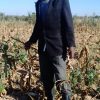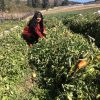News headlines for “Nature and Animal Conservation”
Bringing the Worlds Food Production in Line with Global Climate Goals
- Inter Press Service

NORTHAMPTON, Massachusetts, May 14 (IPS) - Food systems—how we grow, transport, prepare, and dispose of the food we eat—are responsible for roughly one-third of all global greenhouse gas emissions. And those gases are changing the climate, which in turn is disrupting the food supply. It would seem to be a classic vicious circle.
Biodiversity Masterplan: Negotiations on Crucial Science, Technology for Implementation Underway
- Inter Press Service

NAIROBI, May 13 (IPS) - The triple planetary crises of climate change, biodiversity loss, pollution, and waste are escalating. At the current pace, the world is on track to lose one quarter of all plant and animal species by 2030, with one species already dying out every 10 minutes. One million species face extinction. Human activity has already altered three-quarters of the land on Earth and two-thirds of the ocean.
Latin America and the Caribbean Hit with Record-Breaking Heat and Other Climate Effects in 2023
- Inter Press Service

DOMINICA, May 10 (IPS) - Every year for the last four years, a collaborative effort involving scientists and other experts has assessed the state of the climate in Latin America and the Caribbean. The findings have revealed increasingly alarming trends for the world’s second-most disaster-prone region.
Dissenting Voices at Nairobi Soil Health Forum Over Increased Fertilizer Use
- Inter Press Service

NAIROBI, May 09 (IPS) - As the Africa Fertilizer and Soil Health Summit convened in Nairobi to review the progress made in terms of increasing fertilizer use in line with the 2006 Abuja Declaration, experts, practitioners, activists, and even government officials pointed out that accelerated fertilizer use may not be the magic bullet for increased food production in Africa.
Beyond the Fields: Unraveling Zambia's Drought Crisis and the Urgent Call for Climate-Health Solutions
- Inter Press Service

LUSAKA, May 08 (IPS) - For most families in Zambia, April is traditionally a month of plenty—it is typically the beginning of a harvest season for various food and cash crops. Both fresh and dried maize, groundnuts, pumpkins, and a whole variety of both traditional and exotic food crops are usually in full supply and readily available for consumption, supporting household food security and nutrition.
Rainy Chiloé, in Southern Chile, Faces Drinking Water Crisis
- Inter Press Service

SANTIAGO, May 02 (IPS) - The drinking water supply in the southern island of Chiloé, one of Chile's rainiest areas, is threatened by damage to its peatlands, affected by sales of peat and by a series of electricity projects, especially wind farms.
We Should Aim to be at Peace with Nature, Says David Cooper of UN Convention on Biological Diversity
- Inter Press Service

HYDERABAD & MONTREAL, May 02 (IPS) - In a world faced with habitat loss and species extinction, climate change, and pollution, it’s crucial that countries develop their national action plans and create a society that lives in harmony with nature, says David Cooper, Acting Executive Secretary of the UN Convention on Biological Diversity (CBD), in an exclusive interview with IPS.
Press Freedom and Climate Journalism: United in Crisis
- Inter Press Service

ROME, May 01 (IPS) - Journalism is in crisis, again. The challenges to press freedom are enormous and multi-faceted and they are deepening -- in “free” and open societies as well as autocracies. And there are no simple solutions.
Drought and Unequal Water Rights Threaten Family Farms in Chile
- Inter Press Service

QUILLOTA, Chile, Apr 30 (IPS) - For the rural farmers in Chile, a combination of climate change-induced mega droughts, water policies that make access unaffordable and a State that either doesn’t want to or dares not intervene in the water market means family enterprises are dying out.Lack of water threatens the very existence of family farming in Chile, forcing farmers to adopt new techniques or to leave their land.
Using Industrial Waste to Fight Pollution in Brazil
- Inter Press Service

CHAPECÓ, Brazil, Apr 29 (IPS) - Biogas sounds like redemption, the conversion of the sinner. Its production involves extracting energy from filth, from the most disgusting environmental pollution, and at the same time avoiding the worsening of the global climate crisis.
 Global Issues
Global Issues
